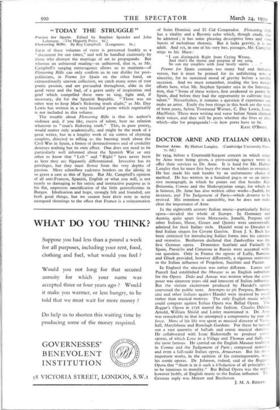DOCTOR ARNE AND ITALIAN OPERA IN 1934, before a Courtauld-Sargent
concert in which songs by Arne were being given, a press-cutting agency wrote to offer their services to, Dr. Arne. It is hard for Mr. Huben Langley that he must first bury the man he wishes to resurrect. He has made his task harder by an unfortunate choice of method. He has written in a hundred pages or so an inten- sive monograph, in which he points out that besides Rule Britannia, Comus and the Shakespearian songs, for which he is famous, Dr. Arne has also written other works—Yudith, for instance, and The 7udgement of Paris—which deserve to be revived. His intention is admirable, but he does not make clear the importance of Arne.
In the eighteenth century Italian music—particularly Italian opera—invaded the whole of Europe. In Germany and Austria, quite apart from Metastasio, Jomelli, Porpora and other Italians, Hasse, Graun and Quantz were unreservedly admired for their Italian style. Handel went to Dresden to find Italian singers for Covent Garden. Even J. S. Bach has been criticised for introducing Italian forms into his cantatas and oratorios. Beethoven declared that Zauberflote was the first German opera. Domenico Scarlatti and Farinelli in Spain, Paesiello and Cimarosa in Russia were accepted with- out question. Only in France the operas of Lully, Rameau, and Gluck provided, however differently, a vigorous resistance to the Italian influence of Pergolese, Sacchini and Piccini.
In England the situation was rather different. Lawes and Purcell had established the Masque as an English substitute for the Opera. Dido and Aeneas was written when the com- poser was nineteen years old and innocent of Italian influence. But the violent excitement produced by Handel's operas coarsened the public taste. Attempts to pit Porpora, Buonon- cini and other Italians against Handel were inspired by social rather than musical motives. The only English music which could compete against Italian Opera was Ballad Opera. The Beggar's Opera in 1728 started the fashion. Charles Dibdin, Arnold, William Shield and Linley maintained it. Dr. Arne was remarkable in that he attempted a compromise by tour tie Joyce. Most of his life was spent as musical director of Vaux- hall, Marylebone and Ranelagh Gardens. For them he turned out a vast quantity of ballads and comic musical sketches. He collaborated with Isaac Bickerstaffe to produce come operas, of which Love in a Village and Thomas and Sally the most famous. He carried on the English Masque tradition in Comus and the 7udgement of Paris ; composed oratorio, and even a full-scale Italian opera, Artaxerxes. But his mo important works, in the opinion of his contemporaries, were his comic operas. Dr. Johnson, indeed, said of the Beggar Opera that "there is in it such a lebefaction of all principles .1', to be injurious to morality." But Ballad Opera was the reply. however feeble, of English music to the Italian influence. Th= German reply was Mozart and Beethoven. J. M. A. RIDLEY.














































 Previous page
Previous page